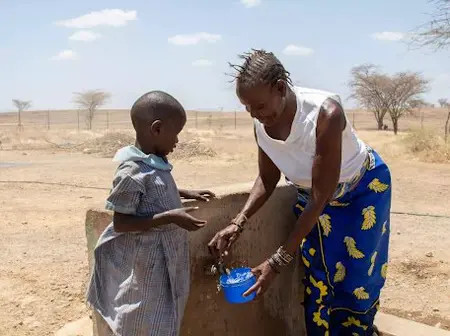Addis Ababa, Ethiopia: The African continent is warming faster than the global average, and the pace of disasters is outstripping the continent’s capacity to cope, a new report shows.
The State of Africa’s Environment 2025 report, produced by Down To Earth and the Centre for Science and Environment (State of Africa’s Environment 2025 report), paints an alarming picture, warning of relentless warming, deadly disasters, and ocean heat waves engulfing the continent.
According to the report released on September 18 in Addis Ababa, Ethiopia, Africa, the world’s second-largest continent, has just lived through its hottest year on record, with almost the entire ocean around it gripped by marine heatwaves.
Between 2021 and 2025, Africa endured its most devastating five-year stretch on record for weather, climate, and water-related disasters. In 2024 alone, the continent’s average annual temperature rose 0.86°C above the 1991–2020 average.
North Africa is the fastest-warming region in Africa, with a staggering 1.28°C.
According to the World Meteorological Organisation’s State of the Climate in Africa 2024, the record-breaking heat collided with unprecedented floods, droughts, and deadly heatwaves.
In Sudan and Somalia, temperatures soared past 45°C, shutting down schools and destroying crops, with the usually bone-dry Sahara Desert seeing five times its annual rainfall in August, triggering rare and destructive floods.
Kenya, Tanzania, and Burundi were battered by floods from March to May that killed hundreds and displaced over 700,000, only to be hit by drought a few months later.
The report warns that Africa’s crisis is not only on land but also in the surrounding seas, which are boiling at record levels.
In 2024, nearly 3 million square kilometres of ocean around Africa were engulfed in marine heatwaves (MHWs). Marine heatwaves are extreme, prolonged spikes in sea surface temperature that devastate marine life and fuel stronger tropical cyclones.
From the Atlantic Ocean to the Mediterranean Sea, MHWs reached “strong, severe or extreme intensity,” smashing the previous record set just a year earlier. This oceanic fever threatens the continent’s coastal fisheries, coral reefs, and food security.
The Intergovernmental Panel on Climate Change’s Assessment Report 5 (AR5) describes Africa’s warming as “beyond natural variability”, warning that without rapid global emissions cuts, temperatures on the continent could rise 3–6°C by 2100.
According to UNESCO, the human toll is already staggering, with an estimated annual climate-driven economic losses of US$1.18 billion in North Africa and US$1.25 billion in Sub-Saharan Africa.
UNESCO representative to Ethiopia, Dr Rita Bissoonauth, said Africa is on the frontline of a climate emergency it did not create.
“This is not just an environmental crisis; it is a profound inequality. It is also a humanitarian crisis,” said Dr Bissoonauth.
She described the State of Africa’s Environment 2025 as more than a scientific assessment, saying it is a moral compass that connects environmental stress, in water, food, and health, to issues of equity and human dignity.
“Its message is clear: the current trajectory is not sustainable”, she said.
Sunita Narain, Director General of Centre for Science and Environment, noted that despite the grim numbers, African countries are not standing still.
“Change is taking shape in Africa. Nations are rolling out net-zero strategies, local adaptation plans, and indigenous knowledge systems to tackle droughts and extreme weather,” said Narain.

Leave a Reply